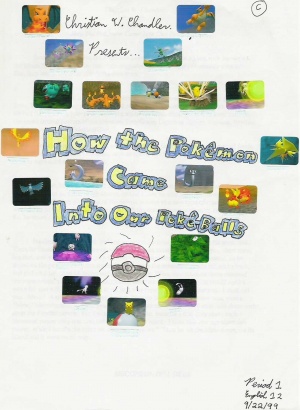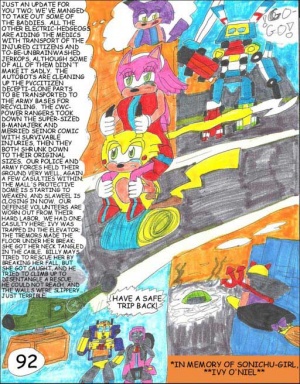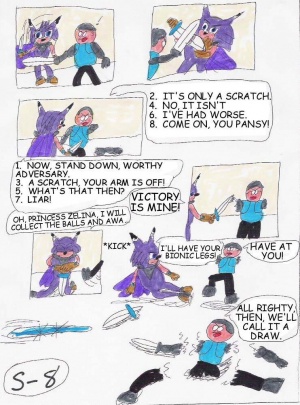Difference between revisions of "Chris and writing"
Brown kitty (talk | contribs) |
Apostrophe (talk | contribs) |
||
| Line 6: | Line 6: | ||
: ''See also: [[Chris and art]], [[Sonichu (comic)]]'' | : ''See also: [[Chris and art]], [[Sonichu (comic)]]'' | ||
Chris's writing shows a juvenile, [[Slow-in-the-minds|simple]] writing style. Like many elementary school kids, Chris frequently pauses from the action to [[Autism|describe exactly what a character is wearing]] and [[Sonichu 8|expound upon trivial aspects of characters]] in unnecessary detail. This is counterbalanced by frequently [[Evan|glossing over things]] that may [[Sonichu Balls|have relevance at some point]]. Sometimes Chris would interrupt an action scene to introduce something that is | Chris's writing shows a juvenile, [[Slow-in-the-minds|simple]] writing style. Like many elementary school kids, Chris frequently pauses from the action to [[Autism|describe exactly what a character is wearing]] and [[Sonichu 8|expound upon trivial aspects of characters]] in unnecessary detail. This is counterbalanced by frequently [[Evan|glossing over things]] that may [[Sonichu Balls|have relevance at some point]]. Sometimes Chris would interrupt an action scene to introduce something that is completely irrelevant to its context.<ref>[http://archive.cogsdev.org/cwcipedia/index.php?title=Issue_0/Page_44 Issue 0 Page 44]</ref> Its overall presentation is consistently sloppy, marked by unwieldy turns of phrase and elementary typographical errors that suggest that Chris does not proofread anything he creates before putting it on the Internet. | ||
Chris produces no preparatory writing of any sort for his stories, content to make them up as he goes along and putting the overall narrative at the mercy of his moods and fancies. He regularly changes his mind as to what the story should be and contradicts what has come before as he pleases, unable to comprehend why this would bother his audience. | Chris produces no preparatory writing of any sort for his stories, content to make them up as he goes along and putting the overall narrative at the mercy of his moods and fancies. He regularly changes his mind as to what the story should be and contradicts what has come before as he pleases, unable to comprehend why this would bother his audience. | ||
Revision as of 21:44, 29 October 2010
Chris's writing is marked by many flaws that have persisted throughout his creative output.
General problems
- See also: Chris and art, Sonichu (comic)
Chris's writing shows a juvenile, simple writing style. Like many elementary school kids, Chris frequently pauses from the action to describe exactly what a character is wearing and expound upon trivial aspects of characters in unnecessary detail. This is counterbalanced by frequently glossing over things that may have relevance at some point. Sometimes Chris would interrupt an action scene to introduce something that is completely irrelevant to its context.[1] Its overall presentation is consistently sloppy, marked by unwieldy turns of phrase and elementary typographical errors that suggest that Chris does not proofread anything he creates before putting it on the Internet.
Chris produces no preparatory writing of any sort for his stories, content to make them up as he goes along and putting the overall narrative at the mercy of his moods and fancies. He regularly changes his mind as to what the story should be and contradicts what has come before as he pleases, unable to comprehend why this would bother his audience.
Exposition
| “ | Fifteen minutes of dialogue, and transformation, later... | ” |
| Chris, not even trying anymore | ||
As a writer, Chris is over-reliant upon exposition, to the point that some works (such as The High School Story) contain nothing else. Chris does not like to illustrate facts of his stories through example, and instead expects the reader to accept his every word as gospel, leaving no room for interpretations that are not TRUE and HONEST. Confusing dialogue for exposition, Chris believes that his level of exposition is normal in mainstream comics.[2]
In addition, Chris critically fails at the literary element "show don't tell" even in illustrated action scenes, choosing instead to describe what a character is doing between two asterisks. (The worst offenders are *CUTS VINES*, *CRASH TO GRASS*[3], *TELEPORTS IN*, and *MAKES GUN DO A 180*.) Apparently even he knows that his shit art is too unclear to convey an idea properly without an additional description.
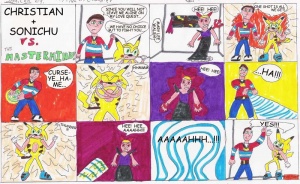
Characterization
- See also: Character design
Chris's characters as they are written are distinguishable only by the vaguest surface elements. Chris's view of ideal personalities in men and women is clear to him, and because he wants all of his creations to be perfect, his characters are barely-distinct variations on a theme. Chris does not comprehend the appeal of characters with flaws. His main response to the criticism that his characters lack personality is denial.
The indistinct characterizations of the Sonichu cast are reflected in their dialogue. Chris does not use dialogue to suggest distinct personalities and worldviews. All characters are equally capable of speaking as Chris does, and from Chris's perspective. Including children.
Consequentially, any attempt at character development fails miserably. Chris marks any change in character by indicating in exposition something akin to "it just happened." With Blake, who arguably goes through the most stark change in character (an antagonist becoming a supporting character), there is absolutely no moral struggle or any build-up to the moment he "flips." His sudden infatuation with Bubbles and an equally sudden mention of mistreatment at the hands of his master are all the reader is given for why Blake changed sides. No reason is given for Wes Iseli's defection to the enemy at all.
Dialogue
Chris only uses dialogue as an expository device in his comics in the bluntest fashion possible. Chris feels the need to include extensive amounts of dialogue in his comic, resulting in textwalls that demand type so small that they often threaten to become illegible. Textwalling is Chris's preferred method of dictating the story as he means for it to be experienced by his reader. Chris has defended this practice due to feeling a "preference to elaborate, because some people rarely get visual references."[4] On a similar note, speech often includes hand-drawn emoticons to display what the speaker is feeling, affirming the notion that Chris doesn't believe that his artwork or dialog alone can convey his ideas, in addition to his total ineptitude with emotions.
Plot and Drama
Chris's confused understanding of reality and fantasy affect his ability to write captivating fiction. Because Chris considers his creations to be "alive" in some parallel universe, he finds that giving them artificially happy and uncomplicated lives is satisfying, and assumes that his TRUE and LOYAL fanbase shares this interest.
Chris seeks to avoid tension or suspense that would trouble his creations and his intended audience wherever possible. Thus, he is unwilling to depict his characters in peril that is convincing, and therefore, "real," and wants to pair them off early and dwell on their long, idyllic romances. Villains tend to put up laughably little challenge, and the protagonists usually win with a show of devastating and effortless force. Initially villains are allowed to posture about a little before Sonichu shows up to ruin their shit, but as the comic goes on and Chris comes into conflict with internet trolls, the battles become even shorter and less-climactic for the sake of emphasis.
Similarly, previews and allusions to the future always emphasize victory over the forces of evil. A vision of the PVCC attacking CWCville ends with Chris saying "Good, we've won!" A preview for a next issue tersely concludes the only marginally dramatic plot arc: "Next issue I get out of the time void." His devotion to dismantling tension is such that in Sonichu 10, Magi-Chan broke the fourth wall to prematurely reveal that he would eventually fall in love with Silvana, presumably so that readers would not have to worry about what would happen to them in the meantime. Even the worst writers would never use the words "spoiler alert" in one's own work (instead opting for foreshadowing), but Chris feels it necessary to spoil a yet-to-be-revealed plot point in his own comic.
As you might guess, on top of everything else this makes the storyline for Sonichu unspeakably boring.
The actual plotting for Sonichu is problematic as well. As soon as Chris becomes uninterested in an idea he presents in his comic, he will resolve it in a quick and often unsatisfying manner. Characters once meant to enter the main cast, such as Ivy, will then be killed off-panel so that Chris can proceed to his newest internet girlf... ahem, plotline of interest. Other narrative threads (such as Meg-chan, Blanca or Jiggliami) can be forgotten and abandoned entirely with, if the reader is lucky, a sentence or two tying up the loose end.
When Chris adds something to a Sonichu comic due to the pressure of another party, he is known to make these additions unsatisfying on purpose for the parties requesting them. The most stupefying example may be the Time Void subplot. Written in after criticism that his alter-ego took up too much of the comic's time, Chris almost removes himself for almost two issues, and when it ends, it just so happens to leave him ready to indulge in the most self-servicing revenge fantasy yet.
Visual clarity
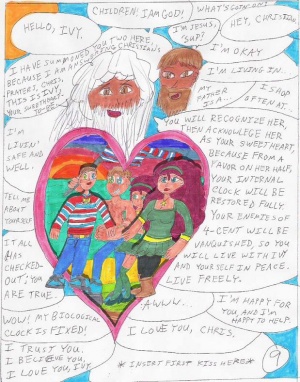
Like many children, Chris is unconcerned with making his comics clear and easily read. Chris does not plan page layouts in advance, and instead draws panels one at a time, cramming however many he can onto the page and further harming his comic's visual clarity. He does not understand that word balloons and text boxes must be arranged left to right and top to bottom in the intended order in each panel, and that the panel's art must be set to accommodate that order. The dialogue flow in panels with multiple word balloons in Sonichu regularly must be pieced together from context clues by the reader. The worst example of this is seen below: Chris establishing a reading order by numbering lines of dialogue.
Chris as a poet and lyricist
- See also: Chris and music
| “ | I’d lay her down caress her gently tickle her fancy; have her tickle my fancy, and give it to her with the learned lonely experience I’ve endured. | ” |
| Chris, expertly stirring feelings of both mild disgust and confusion[5] | ||
In poem and lyric, Chris has a poor understanding of the anatomy of an appealing composition. He mistakes exceedingly saccharine language for romantic. He tends to incorporate rhyme for its own sake, often to the detriment of the song or poem's message. He also pads out gaps with random-access humor and curiously dated language.
He has total disregard for proper meter, and rhymes are forced with odd terms (Rosey, as often as birds tweet/will you be my lovely heartsweet?)[6]. Sometimes, the attempts at rhyming aren't even good (Heart-broken, sad and very lonely,/I may never remove my virginity.)[7].
Not even the Bard is safe from Chris's fail. In Sub-Episode 3 A famous line from Macbeth has a couplet of Chris's making tacked on to its end.[8], while Bubbles mutilates a line from the The Tempest in Sonichu 8[9]. Needless to say, the contrast is not that hard to see.
Chris as a journalist
Nintendo Power was a publication released by Nintendo about Nintendo products. It sought to inform video game enthusiasts anything they might want to know about Nintendo products, and how they should feel about them. It is easily Chris's single greatest journalistic influence. To this day, he seeks to plainly tell the masses what the truth is and how we should feel about it.
Chris's first notable work of journalism is his final project in high school, A Week With Christian Chandler. It is a prime example of Chris's understanding of honesty: the only thing that could reflect poorly on him in his mind was the omission of any fact. Here it would seem that Chris is unwilling to massage the truth because he had yet to experience disapproval of peers that concerned him as the reactions of Internet trolls would later.
Chris's next journalistic effort came in college with Sonichu's News Dash, which presumes that his person and daily life are of inherent reader interest.
Chris as a blogger
Chris's blogging is a continuation of his News Dash mentioned above. In a way, Chris's first and most frequently updated blog was his web page, in which he posted "updates" about his goings-on. The site, however, was not in what most people would consider a blog format. Instead, Chris stuck new updates wherever he could find new space that day, resulting an erratic and bizarre page layout.
He has also experimented with conventional blog formats, and the results are only marginally easier to read.
To this date Chris has had several actual blogs:
The location may change, but the style is consistent and unmistakable. This may be linked to Chris not knowing exactly the purpose of a blog. Ideally, you're publishing your opinions and experiences in a group setting, allowing constant meaningful communication. While Chris has no problems sharing intimate details about his life, he doesn't seem to get the communicative part. Blogs are just another place for him to spew truth and honesty.
Another, arguably more important fault is that Chris's blogs are fucking boring. Most bloggers realize that if you have to spew about your pathetic life, you'd better make it interesting. While Chris does release the occasional laugh, most entries are outright annoying.
Arguably the most notable blog ever made by Chris was the infamous Adam Stackhouse blog. Seething with anger, Chris shows that — just like with Wikipedia — he doesn't want to contribute, but enforce his beliefs on anyone who will listen.
| “ | In any case, I LOATHE Adam and his Sister for STEALING my one chance at taking my Sweet Gal-Friend to Seattle; it would have been terriffic. I might have even been able to change her outlook on not planning on having children (she and I are both virgins; although I am a FRUSTRATED, High-Functionally AUTISTIC, 25-YEAR OLD VIRGIN. And I LOATHE Surybuchwald and Aprelewsky as well, because their MUSIC probably landed those JERKS in 2nd and 3rd. | ” |
| Chris, demonstrating his able skills as net citizen | ||
Chris's reading habits
Anyone who wants to be a good writer must be well-read. It's one of the most natural ways to become acquainted with good style, the elements of a plot, and correct spelling. Chris's ego is so inflated that he thinks he can produce something brilliant with no effort whatsoever. The only books Chris has ever been seen reading are paperback Goosebumps and Fear Street novels which are notable only for their sheer mediocrity. Chris read these books, which were written for elementary schoolers, well into high school. During the Father Call, Chris said that he read To Kill a Mockingbird a month prior, which is almost certainly because it was assigned in high school. This was almost instantly proven false when he confused it with Of Mice and Men, another high school assignment. He has also read The Giver.[10]
See also
Sauces
- ↑ Issue 0 Page 44
- ↑ Mailbag 19
- ↑ Issue 9 Page 52
- ↑ Mailbag 19#Textwalling
- ↑ For My True Love, I Would…
- ↑ Sonichu's Ode to Rosechu
- ↑ Saddest Heart in the World
- ↑ Issue 4 Page 20
- ↑ Issue 8 Page 95 (paraphrasing Miranda's famous line, "O brave new world, That has such people in't!")
- ↑ Wallflower E-mails
| Chris and... |
|
Body: Drugs • Fashion • Gender • Health • Nutrition • Sex Psyche: Coping • Manipulation • Mental healthcare • Nostalgia • Reality Personality: Anger • Ego • Hypocrisy • Introspection • Kindness • Negligence • Personality • Remorse • Stress Expression: Art • Censorship • English • Language • Music • Oratory • Spanish • Writing Society: Animals • Contests • Death • The Law • Politics • Pornography • Race • Reading • Religion • Sexuality • Socialization • Sports Business: Brand loyalty • Business • Copyright • Money • Negotiation • Work Technology: AI • Cameras • Electronics • The Internet • Science • Television • Video Games |
